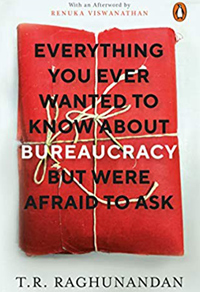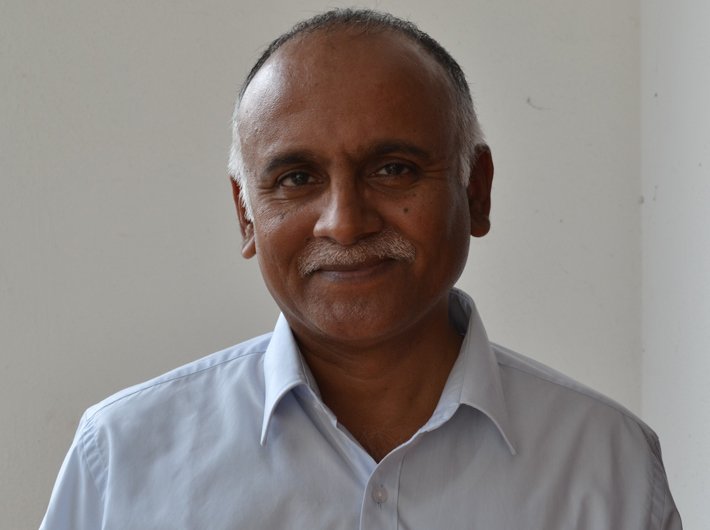Excerpts from T.R. Raghunandan's 'Everything You Ever Wanted to Know About Bureaucracy but Were Afraid to Ask'
Everything You Ever Wanted to Know About Bureaucracy but Were Afraid to Ask
By T.R. Raghunandan
Penguin Books, 272 pages, Rs 399
T.R. Raghunandan quit the Indian Administrative Service in 2010, after 27 years, to concentrate on his pet passions of strengthening local democracy and governments, and working on anti-corruption. A consultant in decentralization, anti-corruption and heritage conservation, he now handles several national and international assignments, including serving as adviser to the Accountability Initiative of the Centre for Policy Research, New Delhi. His new book makes an excellent reading for bureaucrats, civil-service aspirants and civil society alike. With wit and verve, he indeed tells us everything we wanted to know about bureaucracy (but were afraid to ask).
 In this excerpt from a chapter titled ‘How to Get into the Civil Services’, reproduced with permission of the publisher, he talks about his own experience; how he got into the Civil Services.
In this excerpt from a chapter titled ‘How to Get into the Civil Services’, reproduced with permission of the publisher, he talks about his own experience; how he got into the Civil Services.
An Excerpt
The preliminary examination was a cakewalk, given that I was a quiz freak, my general awareness was pretty good and I had reasonably good reading habits. I chose zoology as my subject of choice for the preliminary examination, because I felt it was a more precise subject than law and better suited for an objective, multiple-choice test.
Studying for the main examination started with looking at past question papers; there were bookstores in Connaught Place and a pavement vendor outside the UPSC office who sold these in slim volumes. Since the examination system had been changed in accordance with the recommendations of the Kothari Committee in 1980, the question bank for the new system was not too large. Initially, I joined a group of friends, seniors in the Campus Law Centre, who were studying for the exam. However, I realized soon that they were confusing and scaring me; all the time they were talking about trends or worrying about the large number of people writing the exam. I soon began to study alone, juggling my preparations for the examination with studying for my final two semesters of the law course.
I wrote the exam along with my law classes, got through the prelims, mains and finally, following the interview, I got a rank of 963, which meant I would make it into the group ‘B’ services. I was disappointed and vowed that I would do well next time around. I also realized that while my knowledge of the subjects of choice was reasonably good, I needed to be more systematic and organized in my presentation. I decided to join a good coaching school to prepare better for my next stab at the examination.
The classes at the Rau’s study circle, in Delhi, were a revelation. Old man Rau, a hoarse-voiced bachelor who reeked of stale cigarette smoke, was a laconically precise coach. He rarely repeated himself, so one had to pay full attention to his low and sometimes indistinct voice. Not much was taught; the focus was on precision in stating out what one already knew. Rau had a few instructors who were ruthless in their testing of mock papers. His monologues on preparation for the examinations were often peppered with strategic guessing of topical information that might find their way into the current affairs section of the general studies paper. Some of Rau’s tips for preparation were useful and stayed with me long after I ran the gauntlet of the examinations.
Rau’s advice was as follows:
• Always pay attention to the question and answer to the point, in grammatically correct language. Whatever the language medium in which you write your answers, one must have top-class language skills. Science students needed to pay particular attention to their language, because often they did not fare well as their language skills, even while explaining their own subjects, were poor.
• If there is a word limit, stick to it. The questions are so designed to be answered in exactly the time provided. If one exceeds the word limit, not only will one lose marks for the question, but one will also not have time to finish the examination paper.
• An answer paper is not only to test one’s knowledge of the subject in question. It is also a test of how well one can organize and articulate one’s thoughts on paper. So, do the little things that show that one is systematic and neat. Improve one’s handwriting; leave a neat margin all around on the paper. Write question numbers prominently. At the end of an answer that has a word limit indicated, count the number of words and write them down in brackets. If the answer is about 5 words less than the limit, one is in a good zone and there will not be any negative marking. If one exceeds the word limit, one will lose marks.
• If one has a choice between attempting short-answer questions and writing a discursive answer to a single question, always choose the former, even if one may not know the answer to a few short-answer questions. For example, one may be faced with a choice between answering ten subquestions with two marks each (answers limited to two sentences) and writing an essay of 250 words on a subject that one thinks one knows well, also for twenty marks. One may discover that one knows the answers to six subquestions. Of the remaining four, one may not be sure about two questions but may be able to make educated guesses as to their answers and one may be clueless about the remaining two questions. One’s uncertainty about four questions may drive one to choose to attempt the longer essay-type question. Yet, even if one writes an exceptional essay, one may not be able to get more than twelve to fourteen marks out of the possible twenty. However, if one attempts the short-answer questions, one would certainly get twelve marks for the six questions for which one knows the answers for sure. In addition, one also stands a good chance of raising that to sixteen marks if one’s educated guesses are right. If the wild guesses turn out to be right, one may get the remaining marks too, Furthermore, answering short questions also leaves one with time to ponder other tricky questions and answer them in a measured fashion.
• Always answer the questions that one knows well, first. Displaying one’s strengths in the first half of the paper gives the examiner a good impression and these things matter in the overall context. One will not lose marks for not answering questions in sequence, provided one mentions the question number prominently on the top of the answer. To drive his point home, Rau’s study circle conducted frequent mock exams, at least twice a week. His instructors were relentless in their criticism of our answers, laughed derisively at us and destroyed us with their strict marking, lending a new meaning to the term ‘mock answers’. I started with a mere 30 per cent score initially and never crossed 52 per cent. In the final analysis, the mock examinations at Rau’s were tougher than the final examination papers.
Rau’s advice went beyond the technique of answering the general papers to cover the optional subjects as well. I believed that language skills mattered a great deal in all the papers. I took great care to write my zoology papers as if I were attempting an English paper, writing as if I were explaining scientific concepts to an intelligent novice, avoiding jargon as far as possible.
For the content of the subject papers, Rau was not of much help. So I studied alone at home. I did not stress myself too much. I slept well, nearly ten hours every day—eight hours at night and two hours for an afternoon snooze.
I also went for an hour’s walk in the evening. I talked to myself all the time. As I was reading, I also wrote revision notes, constantly doodling as I wrote. I regret not having kept my revision notes; they were works of art, very elegantly prepared. I drew elaborate patterns, cars, monkey faces and wove anagrams from key words and acronyms that would remind me of things that I had to remember. I even made songs out of some concepts. I converted nearly everything to a visual or an audio content and then attempted to commit an entire page to memory.
